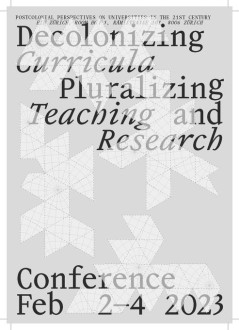Conferenza
During the past decade, public debates about the legacies of imperialism and colonialism in Western countries have reached a new level of intensity not least to the attention generated by the Black Lives Matter movement. Since 2019, the discussion has also entered public debates in countries such as Switzerland that long prided themselves of not being involved in atrocities. The insight that imperialism and colonialism were often pan-European rather than strictly national enterprises is slowly gaining currency. For example, there have been fierce controversies about the fate of statues of Swiss merchants and philanthropists involved in the slave trade. Other widely mediatised disputes have concerned the restitution of objects of art from formerly colonised countries in western museums and the erasure of the n*-word from street names or buildings.
Meanwhile, very few social commentators have so far addressed a phenomenon that is well established in academic circles: the effects of imperial worldviews and various forms of colonial knowledge production that continues to shape universities. Disciplines ranging from anthropology to comparative philology possess a genealogy that is intricately enmeshed in the history of European expansion and the production of colonial power/knowledge. Medicine and “open air sciences” such as geography, geology, botany, or zoology were particularly vital for the success of colonial conquest and exploitation. As a result, the collections of minerals, plant and animal specimens, or fossils that were brought back to Europe from colonial expeditions have been used by generations of lecturers and students in western universities, often without the latter being aware of their sinister past.
If we apply a global perspective, it becomes obvious that the “amnesia” concerning the colonial entanglements of universities often goes hand in hand with other structural legacies of an imperial world built on fundamentally asymmetrical power relations between the “West and the Rest”. Prestige, visibility, and access to generous research funding are highly unequally distributed and concentrated disproportionately in western countries. Ironically, the path to an academic career hence often leads young researchers from the Global South to the old imperial centres of scientific excellence in Europe that had formerly trained colonial administrators.
Alongside this, it is hard to understand why more than half a century after the end of the main wave of decolonisation in Asia and Africa leading academic journals and university presses remain overwhelmingly attached to Euro-American institutions. Finally, particularly in continental European universities yet another irritating phenomenon can be observed: Whilst, due to both large-scale migration and increased student mobility, the student bodies have grown more and more multi-ethnic and diverse in the past decades, the faculty frequently continues to be predominantly white, mono-cultural and male.
The conference “Decolonizing Curricula, Pluralizing Teaching and Research” aims to provide a platform for an urgently needed debate on how universities can make use of postcolonial insights and perspectives to face the challenges of teaching and researching in the 21st century and become more open and diverse institutions, operating in a spirit of historical awareness, equality, and cosmopolitanism. Scholars and experts from around the world and local Swiss researchers, activists, and politicians will share their experience and knowledge and exchange opinions about the appropriate steps to take.
Organizzato da
Monique Ligtenberg and Harald Fischer-Tiné (History of the Modern World, ETH Zürich), Philipp Krauer (Staatsarchiv Schwyz)
Veranstaltungsort
ETH Zürich, Room HG F 5
Rämistrasse 101
8006
Zürich
Ulteriori informazioni sugli eventi
Informazioni sui costi
CHF 0.00
Inscrizione
Iscrizione tramite persona di contatto
